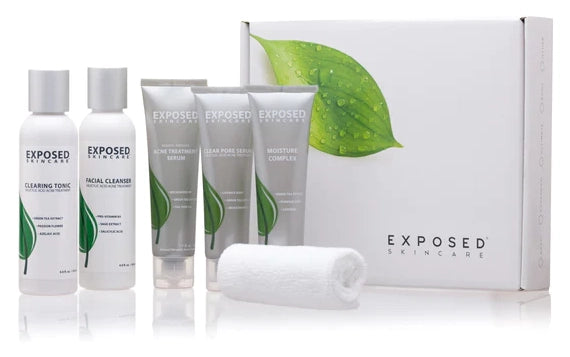One of the most common skin conditions that people deal with is acne. Despite this, the underlying causes of acne are still not entirely clear. Various factors contribute to acne breakouts, including hormonal imbalances, genetics, and, yes, diet.
One food group that often comes under scrutiny is meat. The big question on everyone's mind is, does meat cause acne? In this blog, we will delve deep into the relationship between consuming meat and the health of your skin.
Also read: How to choose the best acne treatment
Biggest Take-Aways:
- Diet and acne are intricately linked, with foods high in glycemic index and certain amino acids contributing to acne.
- While dietary changes can help, they often aren't the sole solution for effective acne management.
- Blood sugar and hormonal imbalances play a key role in the development and severity of acne.
- Exposed Skin Care offers a targeted, comprehensive approach to acne management, filling in the gaps left by dietary and lifestyle changes.

Does Meat Cause Acne? The Meat of the Matter
The question "Does meat cause acne?" is a topic of interest for many. Eating meat is a regular part of many people's diets, but its effect on skin health is controversial.
While some people swear by a plant-based diet to keep their skin clear, others argue that meat doesn't directly cause acne. To set the record straight, let's dig into the factors that make this a complex issue.
Meat Types: Not All Are Created Equal
Different types of meat may have varying effects on acne development. For instance, processed meats like sausages and deli meats are high in additives and preservatives that could lead to acne. On the other hand, lean meats like beef and chicken may not have the same impact.
- Red Meat: Known for its high iron content, red meat also contains an amino acid called leucine, which might contribute to acne.
- White Meat: Chicken and turkey are less likely to cause inflammation inside the body, which could reduce acne.
- Fish: High in Omega-3 fatty acids, fish may help improve skin and prevent acne.
Components of Meat that Could Affect Skin Health
Hormones
While the relationship between hormones in meat and acne is not clear, it is thought that hormonal imbalances can lead to acne. Therefore, it might be worth considering how hormones in meat could affect the skin.
Fats
Saturated fats found in meats can cause inflammation, which could lead to acne.
Leucine
An amino acid found predominantly in meat, leucine has been found to stimulate a chain reaction that stimulates the skin's oil glands and makes acne breakouts more likely.

The Blood Sugar Connection
One aspect that could tie meat consumption to acne is its impact on blood sugar levels. Foods with a high glycemic index can lead to a spike in blood sugar, which may cause the skin to produce more sebum.
This can clog pores and lead to acne. While meat doesn't have a high glycemic index, it's often consumed with foods that do—think burgers with buns or fried chicken.
Insulin Levels and Acne
A spike in blood sugar also increases insulin levels, another potential contributor to acne. Insulin creates a chain reaction that stimulates the skin's oil glands, making acne breakouts more likely.
Low-Glycemic Foods to Consider
Low-glycemic foods include fruits, vegetables, and whole grains. Including more of these in your diet may reduce acne, especially when consumed alongside lean meats.
The Role of Diet and Acne
While the question, "Does meat cause acne?" still lingers, there is no denying diet's role in skin health. Several studies have found that a low-glycemic diet may reduce the severity of acne.

Here's how different foods can affect your skin:
High-Glycemic Foods
Foods with a high glycemic index, like processed foods and fast foods, are proven to increase the risk of acne.
Foods that May Actually Help
- Green Tea: Rich in antioxidants, it can improve your skin health.
- Berries: They contain vitamins and minerals that help keep your skin clear.
- Nuts: High in good fats that can prevent acne
Myths and Misconceptions
It's easy to blame certain foods for acne breakouts, but the cause of acne is often more complex. For instance, the link between drinking milk and acne outbreaks is still a topic of debate. Similarly, the age-old myth of eating chocolate and experiencing increased acne is largely discredited.
Food Allergy and Acne
While not a direct cause, food allergies can cause inflammation and acne. If you suspect that meat or any other food is affecting your skin, try eliminating it from your diet and monitor the changes.
Fried Foods and Acne
Deep-fried foods may lead to an increase in acne because of the oil used in cooking. This oil can cause inflammation inside the body, which in turn can aggravate acne.

Is There a One-Size-Fits-All Answer?
Given the many factors that can lead to acne, it's hard to say that meat is solely responsible for acne. More research is needed to establish a concrete relationship between meat consumption and acne. However, what is clear is that a balanced diet, rich in low-glycemic foods and low in processed items, can go a long way in improving your skin.
Individual Reactions
People are unique, and so is their skin. What might contribute to acne in one person may not in another. Some people are more prone to acne and might find that certain foods, like meat, exacerbate their condition.
Severity Matters
The severity of acne can also affect how diet affects it. For instance, someone with severe acne may find that food has a greater impact on their skin than someone with a milder form.
Keep an Eye on What You Eat
While it may be tempting to avoid eating meat altogether, moderation is key. Paying close attention to how different foods, not just meat, affect your skin can help you make better choices for clear skin.
The Benefits of Using Exposed Skin Care for Managing Acne
Navigating the world of acne treatment can be overwhelming. If you've been experimenting with an acne diet to pinpoint specific foods that cause acne, you might be wondering what else you can do to improve the appearance of acne. That's where Exposed Skin Care comes in.

The benefits of Exposed Skin Care are:
- Targeted Treatment: Exposed Skin Care offers a range of products, such as a facial cleanser and treatment serum, specifically designed to target pimple-causing bacteria.
- Balancing Act: Are you concerned about the oil in the skin? Our Clear Pore Serum controls acne and balances oil production overnight. This is crucial for those who avoid dairy but still develop acne due to other imbalances.
- Comprehensive Kits: From basic to ultimate, our kits contain everything you might need to manage acne vulgaris effectively. They even include Derm-X Cloth for exfoliation and a probiotic complex to balance gut flora, which has a significant impact on acne.
- Proven Results: With more than 400,000 satisfied customers, Exposed Skin Care has demonstrated that a targeted approach can make acne worse to nonexistent, altering your skin's overall health positively.
So, whether you drink more milk or avoid certain specific foods, using Exposed Skin Care can be a game-changer in your battle against acne. It may even reduce your time worrying about your skin, allowing you to focus on a holistic approach to skin health.
Conclusion
Navigating the complicated terrain of acne management requires more than just identifying foods that cause acne or avoiding specific nutrients like leucine and glutamine. It's a comprehensive approach that entails dietary vigilance and a targeted skincare routine.
The connection between diet and acne is undeniably intricate, with specific foods acting as acne-causing agents for some individuals. While altering your diet may reduce the amount of acne you experience, it's often not the standalone solution for persistent acne issues.
Focusing solely on food could mean overlooking other vital aspects of skin care, such as topical treatments that target pimple-causing bacteria and oil production. These targeted treatments can often make a huge difference, serving as the missing puzzle piece in your fight against acne.
They complement the efforts you make in your diet by providing the skincare aspect of a well-rounded acne management regimen. Even as you monitor your diet and make lifestyle changes, a trusted skincare regimen can bridge the gap between your efforts and visible results.
Products like those from Exposed Skin Care can be the game-changer you need, offering a targeted approach to managing acne. In sum, while dietary changes can be beneficial, a multi-pronged approach that includes reliable skincare products can provide a more comprehensive and effective acne solution.
FAQs
Does meat directly cause acne?
No, the meat does not directly cause acne, but certain factors related to meat consumption, like high glycemic index and hormones, may contribute to acne.
What foods are known to trigger acne?
Foods with a high glycemic index, dairy products, and processed foods are known to trigger acne.
Does blood sugar have an impact on acne?
Yes, elevated blood sugar levels can lead to inflammation and hormonal imbalances that may trigger acne breakouts.
Is leucine and glutamine related to acne?
Yes, these amino acids are found in red meat and chicken and can contribute to acne by stimulating oil glands.
How can Exposed Skin Care help in managing acne?
Exposed Skin Care offers targeted treatments that can work alongside your dietary changes to manage acne more effectively. Their products are specifically designed to control oil production and target pimple-causing bacteria.

















